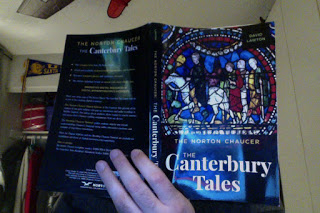Whan That June . . . Again — Lucas Finishes Blogging About The Canterbury Tales
 |
| Well, I never need to reuse this picture again. |
The Intro
That's right, we've finally arrived in Canterbury, readers (Hypothetical or otherwise), this is the final installment of Whan That Month, a mere three months behind schedule. This month I'll be reading the longest of the tales (by about twenty pages) and something that's not a tale at all, so let's jump into—
The Parson's Prologue
Chaucer reckons that it's about four in the afternoon when the Manciple finishes his tale, and Harry Bailly triumphantly proclaims that they lack only one tale (the math definitely doesn't check out there, especially since The Manciple's Prologue is about the lack of a tale from the Cook). So he turns to the Parson who, having listened to the other pilgrim's tales on the road to Canterbury without comment replies, "Y'all need Jesus." And rather than a tale proceeds to deliver—
The Parson's Tale
Which, as it turns out, is a lengthy guide to penitence, which has three parts: 1) contrition, B) confession, and 三) satisfaction. The better part of the tale is devoted to confession because in addition to detailing why people need to confess their sins, the Parson also discusses the differences between venial sins (which will not lead to eternal damnation if left unconfessed) and mortal sins (which will) and goes into great detail about the seven deadly sins (pride, envy, ire, sloth, avarice, gluttony, and lust) and their remedies (humility, loving your neighbor, meekness and patience, fortitude, mercy and generosity, abstinance, and chastity and continence). In any case, you gotta feel bad about your sins, you gotta confess your sins (especially if you're about to participate in the sacrament of holy communion), and you gotta do something to make up for your sins (you know, like praying or mortifying your flesh).
How'd Lucas Like The Parson's Tale?
It may come as a surprise that I did not enjoy reading The Parson's Tale. I did after all say that The Tale of Melibee was less of a slog than I expected. However, The Parson's Tale was exactly as much of a slog as I expected. At 70-ish pages it's about 40% longer than The Tale of Melibee, it's outright just a treatise on confession without even the pretense of a narrative, and it's boring. It's so boring.
The main point of interest to the modern reader is probably the view it gives on medieval theology (although this is also explored some what in the proper tales). The Parson is actually pretty diligent about citing his sources (although the footnotes do point out the places where quotes are either unattributed or unknown). And I certainly won't accuse Chaucer of being anything less than exhaustive in his treatment of penitence. That said, every time a new paragraph began with some variant of "The sinne of (Deadly Sin) hath (Number) speces. . ." I died a little inside. That's right. I don't actually have a lot to say about this one. Oh, actually let's talk a little about how the tale ends.
So, it doesn't really. The end of the sermon feels pretty conclusive, but Chaucer doesn't describe anyone's reaction or reveal anything that transpires in Canterbury cathedral (presumably the pilgrims go to mass or make some other observance). In any case, all that follows is—
Here Taketh the Makere of This Book His Leve
A single page in prose, which is called a "Retraction" in some manuscripts, in which Chaucer both claims authorship of The Canterbury Tales, The Parliament of Birds, and other works and apologizes for their faults (particularly if they have served to induce people into sin). He then points out that he also translated a bunch of books about philosophy, the lives of saints, and other things and hopes that Jesus, Saint Mary, and the hosts of Heaven will take mercy on him and forgive his sins.
How'd Lucas Like Here Taketh the Makere of This Book His Leve
So, this might be a surprise, but I also don't have much to say about the Retraction either. I suppose I could tackle the question of whether Chaucer intended this to be appended to The Canterbury Tales specifically, or if he wrote it as a sort of medieval "About the Author." I mean, it's got all the features you'd expect, he identifies himself, he mentions his others, he prays that his sins will be forgiven . . . wait. Anyway, it was breeze after finishing The Parson's Tale.
The Outro, or, Here Take the Makere of This Blaug His Leve
Wait! Like forever?
No, just to end Whan That Month.
So you don't have anything more to say? Any kind of grand statement? Any sort of summation of what you learned reading the entire extant text of The Canterbury Tales? Not even a ranked list?
Well, no. I mean, I guess I'm a Canterburied out. But maybe there is a ranking coming soon. We'll see. In any case, I don't know if I'll be taking on another "I feel like I ought to have read this book" type challenge in the near future, but I'm glad I can say that I finished The Canterbury Tales, which something Geoffrey Chaucer can't say. BOOM! ROASTED!
You're the worst, Lucas.
‾\_(ツ)_/‾
Comments
Post a Comment